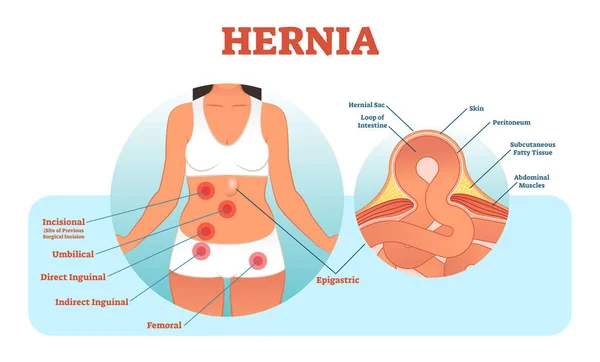Lauren Goodger Battles Infected Hernia, the former star of The Only Way Is Essex, has recently opened up about her distressing health condition, revealing her struggle with a painful hernia. In a candid Instagram post, she described her experience as “scared and in pain,” highlighting the emotional and physical toll this condition has taken on her life. This situation resonates with many who face similar health challenges, shedding light on the often-overlooked issues surrounding hernias.

What Is a Hernia?
A hernia occurs when an organ or fatty tissue protrudes through a weak spot in the surrounding muscle or connective tissue called fascia. Hernias often happen where the abdominal wall is weaker, such as in the groin or belly area.
The most common types of hernias are:
- Inguinal (inner groin) – About 3 out of 4 hernias are in the groin, with inguinal hernias being the most common type. They are much more common in men than women.
- Femoral (outer groin) – Femoral hernias account for only a few out of every 100 hernias and are more common in older women.
- Umbilical (bellybutton) – Umbilical hernias occur in about 15% of newborns.
- Incisional (resulting from a surgical incision) – Incisional hernias make up about 10% of all hernias.
- Hiatal (upper stomach) – Hiatal hernias affect around 20% of people in the U.S. and 50% over the age of 50.
Hernias can often be harmless and pain-free, but at times they can bring discomfort and pain. They are usually straightforward to diagnose by feeling and looking for the bulge. Treatment is a choice between watchful waiting and corrective surgery, either via an open or laparoscopic operation.
Causes of Hernias
Ultimately, hernias are caused by a combination of pressure and an opening or weakness in the muscle or fascia. Common sources of abdominal pressure include:
- Lifting heavy objects improperly
- Diarrhea or constipation
- Persistent coughing or sneezing
- Pregnancy
- Previous abdominal or pelvic surgery
Some people are born with a hernia, called a congenital hernia, which is more common in those born prematurely or with certain conditions like cystic fibrosis. Activities and medical problems that increase pressure on the abdominal wall can also lead to a hernia developing later in life.

Symptoms and Complications
A hernia usually produces a visible bulge, especially when coughing, standing, or straining. The lump may disappear when lying down and can sometimes be pushed back in. You may feel pressure, a dull ache, or sharp pain when the hernia emerges.
Most hernias are not immediately life-threatening, but they don’t go away on their own and can require surgery to prevent dangerous complications. A hernia becomes serious when it gets stuck in the hole it pushed through and can’t go back in. This can become painful, and in severe cases the tissue can lose its blood supply, causing necrosis (tissue death).
Treatment
Treatment for a hernia depends on the type and severity. Options include:
- Watchful waiting for small, painless hernias with no complications
- Open surgery to close the hernia using sutures, mesh, or both
- Laparoscopic surgery using smaller incisions and a camera for faster recovery
Surgery is the only way to effectively treat a hernia, with a generally very good outlook after repair. However, the hernia may recur in some cases. If a hernia is growing larger or causing pain, surgery is often recommended.
Lauren Goodger’s Health Journey
Following the birth of her second child, Lauren developed a small hernia in her belly button, which later became infected. This infection has led to significant swelling and discomfort, prompting her to share her ordeal with her followers. The emotional impact of this health issue is profound, especially considering the tragic loss of her daughter shortly after birth. By sharing her story, Lauren aims to raise awareness about hernias and their challenges. This devastating event occurred just a week after her ex-boyfriend, Jake McLean, died in a car accident, deeply affecting her mental health and well-being.

Mental Health Struggles
Following these traumatic experiences, Lauren has openly discussed her battle with anxiety. She revealed that the emotional toll has led her to make lifestyle changes, including giving up caffeine and alcohol, and has contributed to her experiencing panic attacks. In her candid social media posts, she expressed how these events have altered her life significantly, impacting her ability to engage in everyday activities such as driving on motorways and using lifts.
In May 2024, Lauren shared her struggles with mental health again after a serious accident that left her with multiple injuries. This incident compounded her anxiety, particularly as she was also dealing with her daughter Larose’s viral infection. She described herself as a “grieving mother” and highlighted the ongoing challenges of coping with her past trauma while trying to be a good parent.
Physical Health and Surgery
In addition to her mental health challenges, Lauren has also addressed her physical health. She has decided to have her breast implants removed, stating that she feels it is a healthier choice for her. She described her previous cosmetic surgery experiences, including a “bum lift” in Turkey, as traumatic and acknowledged that she was not in the right mindset for such procedures at the time.
Lauren has emphasized the importance of exercise in her healing process, referring to the gym as her “medicine.” She has committed to regular training and therapy as part of her journey to recovery, aiming to regain her sense of self after the tumultuous events in her life.

Recent Developments
Recently, Lauren has made a return to filming TOWIE, stating that while she felt at home on set, the experience was initially overwhelming after spending so much time focused on motherhood. She described her return as a way to reconnect with herself outside of her role as a mother.
Overall, Lauren Goodger’s health journey has been marked by profound loss, mental health struggles, and a commitment to personal recovery through both physical fitness and addressing her emotional well-being.
View this post on Instagram
Conclusion
Lauren Goodger’s experience with hernia pain serves as a reminder of the importance of addressing health issues proactively. By sharing her journey, she not only raises awareness about hernias but also encourages others facing similar challenges to seek help and support. Understanding the symptoms, treatment options, and coping strategies can empower individuals to take control of their health and well-being.
Also Read | Hollyoaks Star Ali Bastian’s Shocking Breast Cancer Diagnosis at 42







